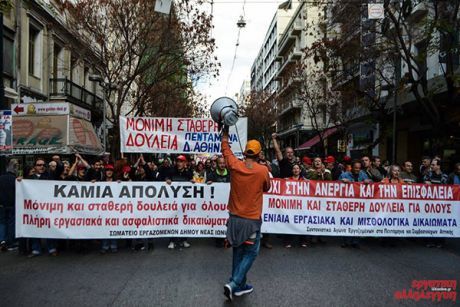Shared
You are here
Greek general strike provokes political crisis

December 4, 2015
As Greece’s parliament debates its budget, workers held the second general strike in a month today, Thursday. Again it was very successful. Transport was widely affected—there were no trains. There’s a lot of pressure on the union federations to call a third general strike if the government pushes a vote on its pensions bill before Christmas.
People are looking for ways to escalate. This isn’t always straightforward. For example many unions relied on their pensioner branches to build for the strike rally. In some ways it was impressive, with pensioners very visible. But it was also smaller.
Workers in a number of sectors have taken encouragement for their own fights. Hospital workers struck for two days, with a very impressive rally yesterday against understaffing. Dockers, rail and public transport workers are coordinating for a demonstration against privatization. The dockers say they will call strikes themselves if the union federations don’t. Others include temporary workers in local government.
All this has very quickly had political implications for prime minister Alexis Tsipras. Recent resignations brought his majority in parliament down to just three MPs, and as many as ten could vote against the pensions bill. It is so unpopular that no-one wants to be blamed for it. Even the pro-austerity opposition parties don’t want to vote for it—they’d rather leave it to Tsipras. They also see the government on the edge and are looking to what will happen if it falls.
A recent council of political leaders was ostensibly called at Tsipras’ initiative to get a consensus on national issues—the refugee crisis and pension reform. Behind the scenes they were wheeling and dealing about a possible new government. Would that be a grand coalition between Tsipras’ left wing party Syriza and the Tory party New Democracy? Would it mean the smaller opposition parties propping up the existing coalition? No-one knows.
Divided
New Democracy itself is divided. Its election for a new leader has stopped, apparently for technical reasons as its IT company let it down. But its real problem is that members are increasingly polarised between two wings. One wants to rebuild through tough opposition to Syriza. The other would rather make sure the austerity package they voted for in summer is implemented.
This all creates an air of political crisis. It’s clear that Greek politics has no “quick fix” to offer. And that encourages people to push for strikes.
At the same time the traditional left wing of the unions are in disarray. Those linked to Syriza will back token action to avoid being isolated, but nothing serious. That’s not surprising. The strange thing is the Popular Unity party. It split from Syriza in the summer and stood against it in September’s election—but continues to organise alongside it in the unions. Its political rhetoric is about smashing austerity and throwing out the bailout agreement, but the industrial strategy doesn’t match. Their eyes are on union elections next year, not on organising struggle.
Workers on the other hand are generalising. The strike rally was full of slogans against bombing Syria or in solidarity with refugees. They are pushing for action—and looking beyond their own particular problems.
We need coordination at the rank and file. The campaign over state broadcaster ERT, where workers’ occupation inspired rallies and even solidarity strikes, must be our model. It’s not an easy strategy. There are steps in the right direction. But getting there will be a fight.
Panos Garganas is editor of Workers Solidarity, Socialist Worker’s sister newspaper in Greece. This is shared from Socialist Worker (UK)
Section:









